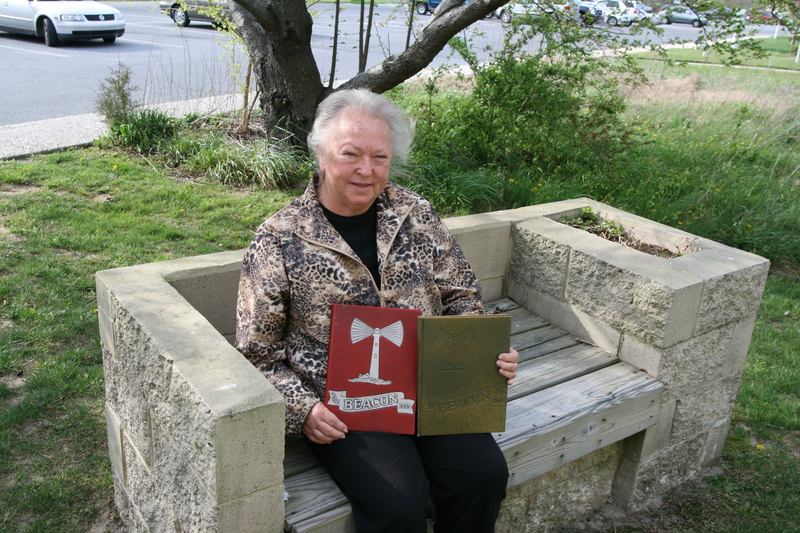Ella Mae Felker looks back at 1960s Lewes
Some local amateur historians are generalists, studying and making observations about periods of time covering hundreds of years. Ella Mae Felker’s historical knowledge is tightly focused on Lewes from the mid to late 1950s through the early 1960s and beyond.
“In school the kids who were a couple years ahead of me used to call me the file cabinet. People in my nurse’s training class called me the computer. If they wanted to know something they’d say ‘Call Ella and ask her,’” Felker said.
A Lewes native, her maiden name was Hudson. She tells stories and knows interesting details about many classmates in her Lewes High School Class of 1961 Yearbook.
“Lewes was a wonderful place to grow up. The teachers were wonderful, and the town was great. We had so much fun,” said Felker, 69.
School days
It was a time when high school students said things such as “We guzzled it,” and “That tears me up.”
Last year for her class’s 50th reunion, she was asked to write about the student body. “I tried to write a novel. I did something from grades 1 through 12. I usually speak at every reunion, too,” she said.
Felker said her Lewes high’s class of ’61 started with 61 students and since then, only two people have died.
“Two girls got pregnant, so we graduated 59,” she said.
Turning the pages of her yearbooks, Felker has something to say about nearly everyone.
“There are a lot of people who are still around here like Charlotte Bastian, Charles Sheppard and David Robinson. That’s Margaret Ann Lupton, she lived where The Buttery is now,” she said.
“That’s Jerry Elliot, he joined the Marines. He’s a plumber in this area. Jerry was an only child; he married an only child, and they had an only child,” she said.
“This was our exchange student, Reinhard. He’s German and he’s world renown. He was so smart and such a nice guy,” she said about Reinhardt Kurth. A Google search reveals Kurth is a medical doctor known for AIDS-HIV research.
Three students became ministers and two girls in the class married ministers.
“That’s so none of them had to have a fulltime job praying for me,” she said laughing.
“That’s who I went to my junior prom with. He’s a veterinarian and lives out in Colorado,” Felker said, pointing to Jack White, whose family owned White Packing and Ice Plant on New Road.
Felker said 1961’s class ring of was the prettiest she’s ever seen. The year could be read correctly even upside down. “Ours was the one with the big lighthouse on top and a black onyx stone. It has 19 on one side and 61 on the other.”
Compared to class ring costs today, 1961 rings were inexpensive. “In those days a girl’s ring cost $17.10 and the boy’s ring was $17.70,” she said. For the extra 50 cents, she bought a boy’s ring because it was larger.
She said the class’ last reunion was a musical extravaganza, and she sang a song she remembered from fifth grade. She said in junior high school she and a friend took liberty with the lyrics of a popular song as others sang the correct words.
“It went like this: ‘My country’s tired of me, I’ll go to Germany, to see the king. His name is Donald Duck, he drives a garbage truck. Oh, what crummy king, in Germany,” Felker sang.
Lewes teachers, classes
Students dubbed one longtime Lewes and later Cape Henlopen high school guidance counselor Mr. Doughnut.
“I think one student must have had detention for about six months because of that,” she said.
There’s a picture of Norman Smith in the yearbook, an English teacher who was in Cape classrooms into the 1970s. “He just got married,” she said.
“There’s Naomi Warren, she taught math, and Mr. Schneller – ‘Tank.’ Back in those days when he taught science you needed to pay attention. You did not talk to your neighbor or horse around because if you did, he’d throw chalk, and it would hit you like a bullet,” Felker said.
“This woman was nuts; she taught art. She had feet about size 13 of a man. She’d go down on the beach in the winter and swim when everybody else was freezing. She had a glass eye, too. Weird.” she said.
Few details have escaped memory.
She said home economics classes she was required to take were a waste of time. “If I’d known my life was going to turn out like it did, I would have taken shop and auto mechanics,” Felker said, adding that she’s been divorced 30 years.
Nursing school days
From 1961 through 1964, Felker trained at Beebe School of Nursing. “We were a big family then. Sometime in the ‘80s it became a business,” she said about the about nursing school. Felker said in high school, the last thing she wanted to be was a nurse.
“I wanted to go to college. I wanted to be a history teacher. But my father said he was not wasting his money to send me to college to go husband hunting,” she said. But she scored well on her nursing school entrance exam, and once in school she liked the curriculum.
“The field I really wanted to work in was pathology and forensics. But to do that you had to be up in a big city, not in Dogpatch,” Felker said. She eagerly volunteered to work with state medical examiners whenever they came to Beebe.
Except for a seven-year period when she traveled with husband Neil, a U.S. Navy Seabee, she worked at Beebe from 1964 through 2010.
“We lived in Japan for a little over three years, then we lived in the Bahamas for three-and-a-half-years, and we lived in California and on Midway Island,” she said.
Felker said she enjoyed traveling. “That’s why I married him, to get out of here.”
She said flying in propeller-driven airplanes between Hawaii and Midway was risky.
“The planes had four props, and I never got out there once without a plane losing at least two of them. Every plane was met by a fire truck, an ambulance and a chaplin,” she said.
Getting it right
Felker said she and Hazel Brittingham, the Cape Region’s unofficial but nonetheless official historian, are friends.
“If we’re in the same place we usually sit together and talk up a storm. Other people just sit and listen,” she said.
Felker said she has to control her tongue around people who think they’re knowledgeable about area history, but who usually have things wrong more often than not.
“If something was like it was as I remember it and someone tries to tell me it wasn’t, then I want to tangle right there,” she said.




















































